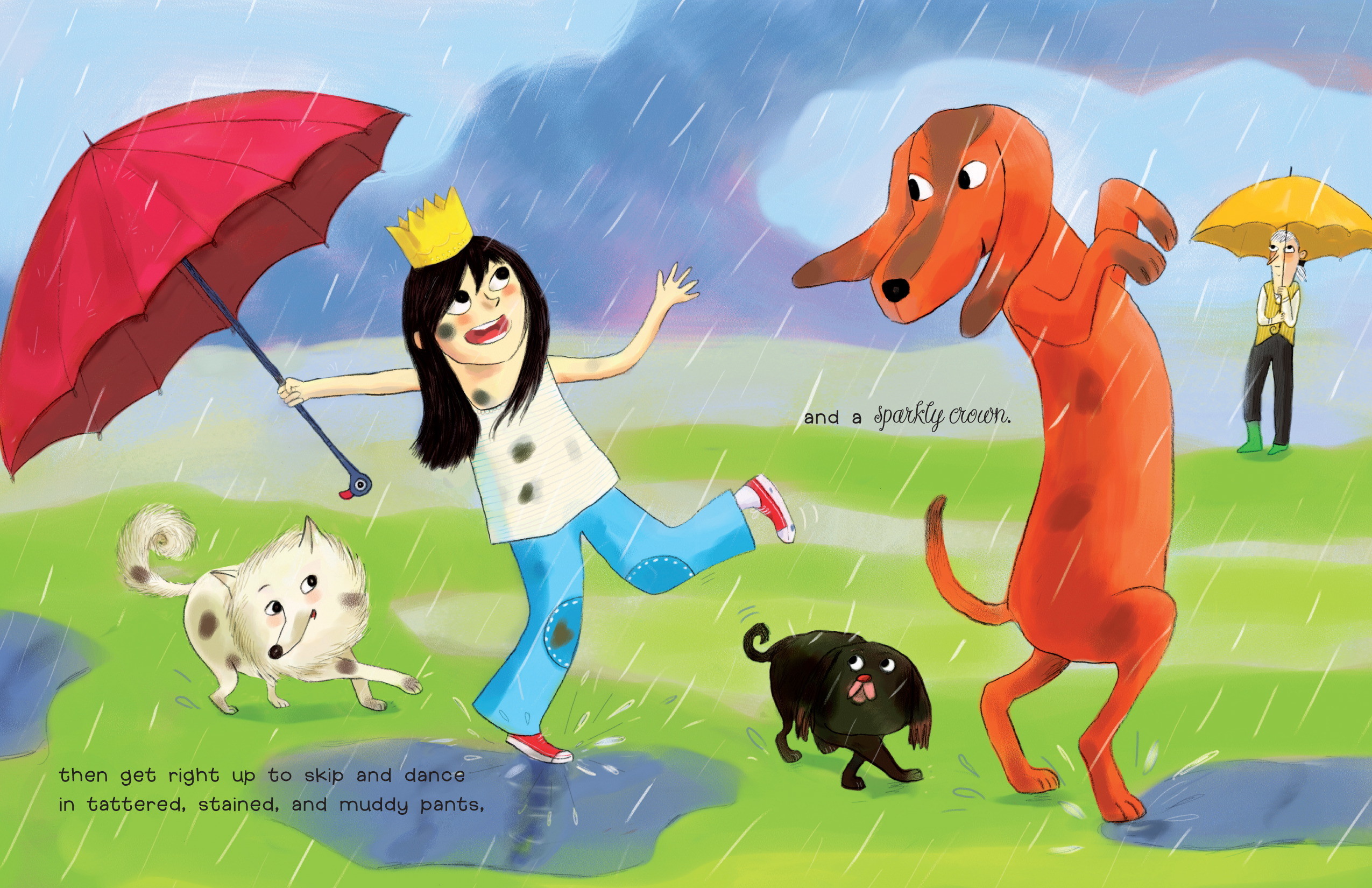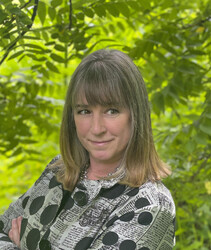Not All Princesses Dress in Pink
By Jane Yolen and Heidi E. Y. Stemple
Illustrated by Anne-Sophie Lanquetin
Table of Contents
About The Book
Celebrate girl power in this exuberant, mischievously illustrated picture book that shows little princesses that they can be whoever they want to be!
Not all princesses dress in pink.
Some play in bright red socks that stink,
blue team jerseys that don’t quite fit,
accessorized with a baseball mitt,
and a sparkly crown!
Princesses come in all kinds. Some jump in mud puddles and climb trees, play sports and make messes—all while wearing their tiaras! Not every girl has a passion for pink, but all young ladies will love this empowering affirmation of their importance and unlimited potential.
Not all princesses dress in pink.
Some play in bright red socks that stink,
blue team jerseys that don’t quite fit,
accessorized with a baseball mitt,
and a sparkly crown!
Princesses come in all kinds. Some jump in mud puddles and climb trees, play sports and make messes—all while wearing their tiaras! Not every girl has a passion for pink, but all young ladies will love this empowering affirmation of their importance and unlimited potential.
Reading Group Guide
A Reading Group Guide Guide to
Not All Princesses Dress in Pink
By Jane Yolen and Heidi E.Y. Stemple
Illustrated by Anne-Sophie Lanquetin
Discussion Questions
1. Reading the title Not All Princesses Dress in Pink reveals information to the reader, even before the book is read! How do you know from the title that this book is not a traditional story about princesses? What visual clues on the cover of the book confirm this fact?
2. Talk about other princess-themed books you’ve read at home and in the classroom. How is this book similar, yet very different?
3. What does it mean to be a "princess"? Can a girl be a princess sometimes, but not all the time? Is it OK to be a girl and not want to be a princess? Why or why not?
4. Why does each princess keep a sparkly crown on her head throughout the story, even when she is doing something decidedly un-princess like?
5. Talk about "traditional girl" and "traditional boy" roles and views in our society. How does this book go against those traditional thoughts?
6. Not All Princesses Dress in Pink proves that girls can freely pursue many different interests – in fact, they can do anything they set their mind to doing. If you are a girl, how is this true in your life?
7. This book sends a strong message that everyone should be true to themselves. What does this mean? And why is this important?
8. There are many real princesses who play sports, like some of the girls in Not All Princesses Dress in Pink. Princess Anne of Great Britain has been on the British Olympic Equestrian team. Princess Charlene was an Olympic swimmer from South Africa; and even recent Princess Kate Middleton played field hockey when she was in high school. After considering all this and looking at all of the different princesses depicted in the book, which princess is most like you, or another girl you know well?
Activities
1. Host a "Girl Power" day in your classroom! Some ideas: Have your students find out more about notable successful girls today in the fields of sports and entertainment. Have them research and celebrate important women in today's world, and from the past. Invite a local female politician or businesswoman to speak to your class. Ask the girls in your class to brainstorm even more ideas!
2. Interests and activities – yours, mine, or ours? Many boys and girls share the same interests and activities. For example, both can play soccer, and both can play the violin. Make a list of all of the activities, hobbies and interests of each of your students. Then, graph or chart which interests overlap, and which do not. Are the results surprising to your students? Why or why not?
3. What are princesses really like? Have your students find out more about the real princesses in the world today, and compare them to the princesses of the past. Do these princesses only wear pink, or are they more like the princesses found in this book?
This guide has been provided by Simon & Schuster for classroom, library, and reading group use. It may be reproduced in its entirety or excerpted for these purposes.
Not All Princesses Dress in Pink
By Jane Yolen and Heidi E.Y. Stemple
Illustrated by Anne-Sophie Lanquetin
Discussion Questions
1. Reading the title Not All Princesses Dress in Pink reveals information to the reader, even before the book is read! How do you know from the title that this book is not a traditional story about princesses? What visual clues on the cover of the book confirm this fact?
2. Talk about other princess-themed books you’ve read at home and in the classroom. How is this book similar, yet very different?
3. What does it mean to be a "princess"? Can a girl be a princess sometimes, but not all the time? Is it OK to be a girl and not want to be a princess? Why or why not?
4. Why does each princess keep a sparkly crown on her head throughout the story, even when she is doing something decidedly un-princess like?
5. Talk about "traditional girl" and "traditional boy" roles and views in our society. How does this book go against those traditional thoughts?
6. Not All Princesses Dress in Pink proves that girls can freely pursue many different interests – in fact, they can do anything they set their mind to doing. If you are a girl, how is this true in your life?
7. This book sends a strong message that everyone should be true to themselves. What does this mean? And why is this important?
8. There are many real princesses who play sports, like some of the girls in Not All Princesses Dress in Pink. Princess Anne of Great Britain has been on the British Olympic Equestrian team. Princess Charlene was an Olympic swimmer from South Africa; and even recent Princess Kate Middleton played field hockey when she was in high school. After considering all this and looking at all of the different princesses depicted in the book, which princess is most like you, or another girl you know well?
Activities
1. Host a "Girl Power" day in your classroom! Some ideas: Have your students find out more about notable successful girls today in the fields of sports and entertainment. Have them research and celebrate important women in today's world, and from the past. Invite a local female politician or businesswoman to speak to your class. Ask the girls in your class to brainstorm even more ideas!
2. Interests and activities – yours, mine, or ours? Many boys and girls share the same interests and activities. For example, both can play soccer, and both can play the violin. Make a list of all of the activities, hobbies and interests of each of your students. Then, graph or chart which interests overlap, and which do not. Are the results surprising to your students? Why or why not?
3. What are princesses really like? Have your students find out more about the real princesses in the world today, and compare them to the princesses of the past. Do these princesses only wear pink, or are they more like the princesses found in this book?
This guide has been provided by Simon & Schuster for classroom, library, and reading group use. It may be reproduced in its entirety or excerpted for these purposes.
About The Illustrator
Anne-Sophie Lanquetin
Anne-Sophie Lanquetin has illustrated several children’s books, including Ten Monkey Jamboree by Dianne Ochiltree. She lives in Paris, France.
Product Details
- Publisher: Simon & Schuster Books for Young Readers (May 25, 2021)
- Length: 32 pages
- ISBN13: 9781665913010
- Ages: 4 - 8
Raves and Reviews
* “Lanquetin’s digitally rendered illustrations depict girls of all shapes, sizes and colors; they are mischievous, exuberant, dirty, exhausted, serious and, most of all, authentic. A joyful and much-needed antidote to the precious pink pestilence that has infested picture books aimed at girls.”
-- KIRKUS, May 15, 2010, * STAR
Resources and Downloads
High Resolution Images
- Book Cover Image (jpg): Not All Princesses Dress in Pink Fixed Layout eBook 9781665913010
- Author Photo (jpg): Jane Yolen Photograph by Jason Stemple(0.1 MB)
Any use of an author photo must include its respective photo credit
- Author Photo (jpg): Heidi E. Y. Stemple Photograph by Heidi E. Y. Stemple(0.1 MB)
Any use of an author photo must include its respective photo credit






